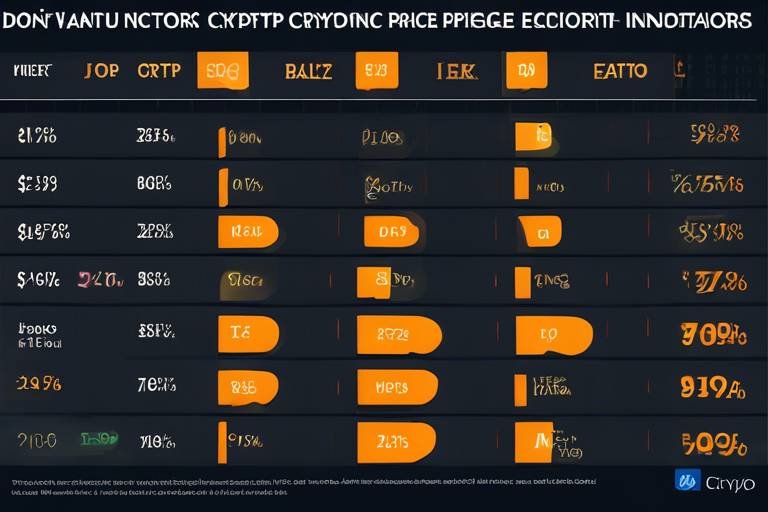The Role of Community Governance in Crypto Projects
In the ever-evolving world of cryptocurrency, the concept of community governance has become a cornerstone of how projects are developed and sustained. Imagine a ship sailing on the vast ocean of digital currency; the crew, consisting of diverse stakeholders, must work together to navigate towards success. Community governance is that collaborative effort, where every voice matters, and every decision can steer the ship in a new direction. This article delves into the intricate ways community governance shapes the trajectory of crypto projects, highlighting its role in fostering trust, encouraging innovation, and ensuring sustainability in a decentralized ecosystem.
At its core, community governance is about collective decision-making. It empowers stakeholders—be they developers, investors, or users—to participate actively in the project's direction. This participatory approach not only enhances the project's adaptability to changing market conditions but also builds a strong sense of ownership among community members. As we explore this topic, it’s essential to understand that community governance is not just a trend; it's a fundamental shift in how we think about power dynamics in the blockchain space.
The importance of community governance cannot be overstated. In a landscape often marred by scams and centralized control, a well-structured governance model can act as a beacon of transparency and accountability. Stakeholders feel more secure when they know they can voice their opinions and influence decisions. It’s akin to a town hall meeting where everyone has a say, and the outcome reflects the collective will of the community. This not only attracts new participants but also retains existing ones, creating a vibrant ecosystem.
As we dive deeper into this article, we will explore the multifaceted benefits of community governance, the challenges it faces, and real-world examples of its implementation. By the end, you will have a comprehensive understanding of why community governance is not just an accessory to crypto projects, but rather a vital component that can determine their success or failure.
Community governance refers to the processes by which stakeholders collectively make decisions in a crypto project. This section will delve into its principles and significance in fostering transparency and inclusivity.
Community governance offers numerous advantages, including enhanced trust, increased participation, and improved project sustainability. Here, we will examine these benefits and their impact on the overall success of crypto initiatives.
Trust is crucial in the crypto space. This subheading discusses how community governance fosters transparency, thereby building confidence among stakeholders and attracting new participants to the project.
Decentralization is a core principle of blockchain technology. This section explores how community governance redistributes power among stakeholders, reducing the risk of centralization and promoting fairness in decision-making.
Active participation from community members is essential for a project's longevity. This part highlights how community governance encourages engagement, leading to diverse perspectives and innovative solutions.
While beneficial, community governance also faces challenges, such as decision-making inefficiencies and potential conflicts. This section will address these issues and suggest ways to mitigate them.
Examining real-world examples can provide insights into effective community governance. This section will highlight successful crypto projects that have thrived through strong community engagement and governance structures.
DAOs are a prime example of community governance in action. This subheading will explore how DAOs operate and their role in empowering communities within the crypto ecosystem.
Not all community governance models succeed. This section will analyze notable failures in crypto projects, identifying key lessons learned to inform future governance strategies.
Looking ahead, community governance will continue to evolve. This final section discusses emerging trends and technologies that may shape the future of governance in cryptocurrency projects.
- What is community governance? Community governance is the process through which stakeholders in a crypto project make collective decisions, ensuring inclusivity and transparency.
- Why is community governance important? It fosters trust, enhances participation, and contributes to the sustainability of a project by involving stakeholders in decision-making.
- What are DAOs? Decentralized Autonomous Organizations (DAOs) are organizations governed by smart contracts on the blockchain, allowing for community-led decision-making.
- What challenges does community governance face? Challenges include decision-making inefficiencies, potential conflicts, and the risk of disengagement from community members.

Understanding Community Governance
Community governance is a fascinating concept that serves as the backbone of many cryptocurrency projects. At its core, it refers to the processes through which stakeholders—ranging from developers and investors to everyday users—come together to make collective decisions about the direction and management of a project. This kind of governance is essential in the crypto space, where traditional hierarchical structures are often replaced by decentralized frameworks. The significance of community governance lies in its ability to foster transparency and inclusivity, allowing everyone involved to have a voice in shaping the future of the project.
One of the key principles of community governance is the idea of shared ownership. Unlike traditional business models where a select few hold the reins, community governance empowers all participants to contribute to the decision-making process. This not only promotes a sense of belonging but also encourages a diverse range of ideas and solutions. Imagine a garden where every member of the community can plant their seeds; the result is a vibrant ecosystem where various plants thrive, each contributing to the overall beauty and health of the garden.
Moreover, community governance plays a crucial role in building trust among stakeholders. In an industry often criticized for its opacity, having a system where decisions are made openly can significantly enhance confidence. When people can see how decisions are made—whether through voting mechanisms, forums, or transparent communication channels—they are more likely to engage and invest in the project. Transparency becomes a powerful tool that not only attracts new participants but also retains existing ones.
However, effective community governance requires more than just participation; it demands a framework that encourages collaboration and constructive dialogue. This is where technology can come into play. Many projects utilize blockchain-based voting systems, which allow stakeholders to vote on proposals securely and transparently. By leveraging these technologies, projects can ensure that every voice is heard, and every vote counts. This not only enhances the democratic nature of the governance process but also helps in building a community that is actively involved in its own destiny.
In summary, community governance is not just a buzzword in the crypto world; it is a vital mechanism that drives projects forward. By prioritizing transparency, inclusivity, and shared ownership, crypto projects can cultivate a thriving community that is invested in the project's success. As we delve deeper into the benefits and challenges of community governance, it becomes evident that understanding this concept is crucial for anyone looking to navigate the complex landscape of cryptocurrency.

Benefits of Community Governance
Community governance is not just a buzzword in the crypto world; it’s a transformative approach that redefines how projects operate. One of the most significant advantages of community governance is the enhanced trust it fosters among stakeholders. When community members have a say in decision-making, they feel more invested in the project. This sense of ownership is crucial, especially in the decentralized landscape of blockchain, where trust can often be a scarce commodity.
Moreover, community governance encourages increased participation. When stakeholders know their voices matter, they are more likely to engage actively. This participation can take various forms, from voting on proposals to contributing ideas and solutions. The more diverse the input, the richer the outcomes. For instance, a project that welcomes feedback from its community can adapt and innovate much faster than one that relies solely on a centralized team.
Another critical benefit of community governance is its impact on project sustainability. By involving a broad range of stakeholders in decision-making, projects can better align their goals with the needs and desires of the community. This alignment not only helps in retaining existing participants but also attracts new ones. Think of it like a thriving ecosystem where every organism plays a role; the health of the ecosystem depends on the interactions and balance among its members.
To put this into perspective, let’s consider a few key points:
- Trust and Transparency: Open governance processes build confidence among community members, leading to higher retention rates.
- Active Engagement: When people feel heard, they are more likely to contribute positively, resulting in innovative solutions.
- Sustainability: Projects that listen and adapt to their communities tend to have longer lifespans and more robust growth.
In essence, the benefits of community governance extend beyond the immediate project environment. They create a ripple effect that enhances the overall blockchain ecosystem. When projects are governed by their communities, they not only thrive but also contribute to a more inclusive and resilient crypto landscape. This model of governance is like a well-tuned orchestra, where each instrument adds its unique sound, creating a harmonious symphony that resonates with everyone involved.
As we delve deeper into the world of community governance, it’s essential to recognize that while the benefits are substantial, they come with their own set of challenges. However, the potential for innovation and growth makes the journey worthwhile.
Q: What is community governance in crypto projects?
A: Community governance refers to the collective decision-making processes within a cryptocurrency project, where stakeholders have a say in important matters.
Q: How does community governance enhance trust?
A: By allowing stakeholders to participate in decision-making, community governance fosters transparency and accountability, which builds trust among participants.
Q: What are the challenges associated with community governance?
A: Some challenges include decision-making inefficiencies, potential conflicts among community members, and the risk of unproductive discussions.
Q: Can community governance lead to better project outcomes?
A: Yes! When community members actively participate, they bring diverse perspectives that can lead to more innovative solutions and sustainable growth.

Enhanced Trust and Transparency
In the world of cryptocurrency, trust isn't just a nice-to-have; it's a fundamental necessity. Without trust, projects can crumble faster than a house of cards. That's where community governance steps in, acting like a sturdy foundation that supports the entire structure. By involving stakeholders in the decision-making process, crypto projects can foster a sense of transparency that is often lacking in traditional financial systems. Imagine being part of a team where every member has a say; it not only builds confidence but also creates a community that's invested in the project's success.
When stakeholders are actively involved in governance, they gain insights into how decisions are made. This openness can significantly reduce the skepticism that often surrounds cryptocurrency projects. For instance, when a project shares its development roadmap or financial reports openly, it allows the community to see where funds are allocated and how the project is progressing. This level of transparency can enhance trust in several ways:
- Open Communication: Regular updates and forums enable stakeholders to voice their concerns and suggestions, creating a dialogue that fosters trust.
- Accountability: When community members have a role in governance, they hold each other accountable. This mutual oversight helps in minimizing fraud and mismanagement.
- Shared Goals: A transparent governance structure aligns the interests of the community with those of the project, leading to a shared vision and collective success.
Moreover, the decentralized nature of community governance means that no single entity holds all the power. This redistribution of authority not only mitigates the risk of corruption but also ensures that diverse perspectives are considered in decision-making. Think of it this way: if a project were a ship, community governance is like having multiple captains steering it together, rather than one person making all the calls. This collaborative approach not only enhances trust among participants but also attracts new users who are looking for a project that values their input and prioritizes ethical governance.
In conclusion, community governance acts as a beacon of trust and transparency in the often murky waters of cryptocurrency. By enabling stakeholders to participate actively, projects can cultivate a culture of openness that not only reassures existing members but also draws in new participants. As the crypto landscape continues to evolve, the emphasis on community governance will likely become even more pronounced, paving the way for a more trustworthy and transparent ecosystem.
- What is community governance in cryptocurrency?
Community governance refers to the processes by which stakeholders collectively make decisions in a crypto project, enhancing transparency and inclusivity. - How does community governance build trust?
By involving stakeholders in decision-making and maintaining open communication, community governance fosters transparency and accountability, which are crucial for building trust. - What are the benefits of decentralized governance?
Decentralized governance redistributes power among stakeholders, reducing the risk of corruption and ensuring diverse perspectives are considered. - Can community governance lead to inefficiencies?
Yes, while it has many benefits, community governance can sometimes result in slower decision-making processes due to the need to accommodate diverse opinions.

Decentralization of Power
Decentralization is not just a buzzword in the world of cryptocurrency; it’s the very foundation upon which blockchain technology is built. In a traditional governance model, power is often concentrated in the hands of a few individuals or organizations, leading to potential abuse and a lack of accountability. However, community governance flips this script, redistributing power among all stakeholders involved in a crypto project. This redistribution is crucial because it not only democratizes decision-making but also enhances the project’s resilience against failures and misconduct.
Imagine a ship sailing on the open sea. If only one person steers the ship, any mistake could lead to disaster. However, when every crew member has a say in navigating, the ship can adjust its course more effectively, adapting to changing weather conditions and unforeseen obstacles. This analogy perfectly encapsulates the essence of decentralization; it empowers everyone involved to contribute to the direction of the project, thereby fostering a sense of ownership and accountability.
One of the most significant advantages of decentralizing power is the **reduction of risks associated with centralization**. In centralized systems, a single point of failure can lead to catastrophic outcomes. For instance, if a central authority is compromised, the entire system is at risk. In contrast, decentralized governance spreads this risk across a broader base, making it much harder for any single entity to exert undue influence or control. This is particularly important in the crypto space, where trust is paramount.
Moreover, decentralization encourages a more **inclusive decision-making process**. When power is distributed, it opens the door for diverse voices and perspectives to be heard. This inclusivity not only enriches discussions but also leads to more innovative solutions. In a decentralized environment, stakeholders can propose ideas, vote on initiatives, and collaborate on projects, which ultimately leads to a more dynamic and adaptive ecosystem.
To illustrate this point, consider the governance structure of a typical Decentralized Autonomous Organization (DAO). DAOs operate on smart contracts, allowing members to propose changes or vote on various issues. This structure ensures that everyone has a stake in the outcome, making the community more engaged and invested in the project’s success. The result? A thriving ecosystem where creativity and innovation flourish.
However, it’s essential to recognize that decentralization is not without its challenges. For instance, while distributing power can lead to more democratic decision-making, it can also result in **decision-making inefficiencies**. When too many voices are involved, reaching consensus can become a cumbersome process, potentially stalling progress. Therefore, finding the right balance between decentralization and efficiency is crucial for the success of community governance in crypto projects.
In conclusion, decentralization of power is a cornerstone of community governance in cryptocurrency projects. By redistributing authority among stakeholders, we not only mitigate risks associated with centralization but also foster a more inclusive and innovative environment. As we continue to navigate the evolving landscape of blockchain technology, embracing decentralization will be key to unlocking the full potential of community-driven governance.

Engagement and Participation
In the vibrant world of cryptocurrency, are not just buzzwords; they are the lifeblood of any successful project. Imagine a bustling marketplace where every voice matters, where every opinion can spark innovation. That's what community governance aims to create. By fostering an environment where stakeholders actively contribute to decision-making, crypto projects can harness a wealth of ideas and perspectives that might otherwise go unnoticed.
Active participation is crucial for several reasons. First, it ensures that a diverse range of viewpoints is considered, which can lead to more robust and innovative solutions. When community members feel empowered to share their thoughts and suggestions, they’re likely to contribute unique insights that can drive the project forward. Moreover, this inclusivity helps in identifying potential issues early on, allowing teams to pivot or adjust strategies before problems escalate.
Additionally, when individuals see their contributions making a tangible impact, it boosts their sense of ownership and loyalty to the project. This feeling of ownership is vital in the crypto space, where projects can sometimes feel impersonal or disconnected. By creating a platform for engagement, projects can transform passive observers into active participants. This transformation is akin to turning a casual viewer of a sports game into a die-hard fan, cheering for their team with unwavering enthusiasm.
Engagement can take many forms, from voting on key proposals to participating in community discussions or even contributing to development efforts. For instance, many crypto projects utilize platforms like Discord or Telegram to facilitate real-time communication among community members. These platforms allow for quick feedback loops and enable participants to collaborate on ideas instantly. Furthermore, projects often host regular AMA (Ask Me Anything) sessions, where stakeholders can directly interact with project leaders, ask questions, and express their concerns. This transparency not only builds trust but also encourages more people to join the conversation.
However, fostering engagement isn't without its challenges. It requires consistent effort and a genuine commitment from project leaders to listen and respond to community feedback. If stakeholders feel their voices are ignored, they may disengage, leading to a stagnant project. Therefore, it’s essential for governance structures to implement mechanisms that not only encourage participation but also reward it. For example, some projects offer tokens or other incentives to community members who actively contribute to discussions or help with project tasks.
In summary, engagement and participation are not just important; they are essential for the health and sustainability of crypto projects. By creating an inclusive environment where every voice is valued, projects can tap into the collective wisdom of their community, driving innovation and ensuring long-term success.
- What is community governance in crypto projects?
Community governance refers to the collective decision-making processes that involve stakeholders in a cryptocurrency project, allowing them to have a say in its direction and operations. - Why is engagement important in crypto projects?
Engagement is crucial as it fosters a sense of ownership among community members, leading to innovative solutions, diverse perspectives, and increased loyalty to the project. - How can projects encourage participation?
Projects can encourage participation by creating open communication channels, hosting AMAs, and offering incentives for active contributions. - What are some challenges of community engagement?
Challenges include ensuring that all voices are heard, maintaining consistent communication, and preventing disengagement if community feedback is ignored.

Challenges of Community Governance
While community governance offers a plethora of benefits, it is not without its challenges. One of the most significant hurdles is the potential for decision-making inefficiencies. In a decentralized system where every voice can be heard, reaching a consensus can often feel like herding cats! Imagine trying to get a group of friends to decide on a movie—everyone has their preferences, and it can take ages to agree on one. Similarly, in crypto projects, the more stakeholders involved, the longer it can take to make decisions. This can slow down the project’s progress and lead to frustration among community members.
Another challenge is the risk of conflicts of interest. In any community, individuals may have different motivations and goals. For instance, some participants might prioritize short-term gains while others focus on long-term sustainability. This divergence can lead to heated debates and even factions within the community, which can be detrimental to the project’s overall health. Imagine a team where half the members want to go for a quick win, while the other half are in it for the long haul. The resulting discord can stall progress and erode trust.
Moreover, the lack of experience among community members can pose a significant challenge. Many participants in crypto projects are newcomers to the space and may not fully understand the complexities of governance. This inexperience can lead to poor decision-making and a lack of effective participation. To combat this, projects need to invest in educational resources and training to empower their community members. Just like how a sports team practices to improve their skills, crypto communities must also focus on learning and development.
In addition to these challenges, there is also the issue of voter apathy. Even in well-structured governance systems, a significant portion of the community may not actively participate in voting or decision-making processes. This can lead to a situation where a small group of vocal participants dominates discussions, while the majority remains silent. It’s akin to a classroom where only a few students raise their hands, leaving the teacher to rely on a limited perspective. To mitigate this, it’s crucial for projects to create engaging and inclusive environments that encourage participation from all members.
Finally, the evolution of technology itself can introduce challenges. As blockchain technology continues to advance, the governance structures must adapt accordingly. This can be overwhelming for communities that are trying to keep up with rapid changes. It’s like trying to learn a new language while simultaneously navigating a new culture. To succeed, communities must be willing to embrace change and continuously refine their governance models to stay relevant.
In summary, while community governance is a powerful tool for fostering collaboration and innovation in crypto projects, it comes with its own set of challenges. By acknowledging these challenges and proactively addressing them, communities can create a more robust governance framework that not only enhances participation but also drives the success of their projects.
- What is community governance? Community governance refers to the processes by which stakeholders collectively make decisions in a crypto project, emphasizing transparency and inclusivity.
- What are the main challenges of community governance? The main challenges include decision-making inefficiencies, conflicts of interest, lack of experience among members, voter apathy, and the need to adapt to evolving technology.
- How can communities improve participation in governance? Communities can improve participation by creating engaging environments, providing educational resources, and encouraging diverse perspectives in decision-making.

Case Studies of Successful Community Governance
When it comes to community governance in cryptocurrency projects, real-world examples serve as powerful illustrations of how effective governance can drive success. One standout example is Uniswap, a decentralized exchange that has thrived due to its robust governance model. Uniswap operates through a community-driven framework where token holders participate in decision-making processes. This model not only empowers users but also fosters a sense of ownership and responsibility among stakeholders. Decisions regarding protocol upgrades, fee structures, and other critical aspects are made collectively, ensuring that the interests of the community are prioritized.
Another fascinating case is MakerDAO, which governs the DAI stablecoin. MakerDAO utilizes a system of smart contracts and governance tokens to enable decentralized decision-making. Token holders can vote on various proposals, such as risk parameters and collateral types, thereby shaping the future of the DAI ecosystem. This participatory approach has led to greater transparency and trust, as community members have a direct say in the direction of the project. The success of MakerDAO is a testament to how engaging the community can lead to sustainable growth and innovation.
To further illustrate the impact of community governance, let’s consider Aragon. This project focuses on providing tools for creating and managing decentralized organizations. Aragon’s governance model allows users to create their own governance structures tailored to their specific needs. This flexibility has attracted a diverse range of projects and communities, each with unique goals and governance styles. By enabling users to customize their governance processes, Aragon has demonstrated the versatility and effectiveness of community-driven decision-making.
However, it’s essential to recognize that not all projects have succeeded in their governance efforts. For instance, Bancor faced challenges in its governance model, leading to community discontent. The lessons learned from such failures highlight the importance of adaptability and responsiveness in governance structures. Projects must remain vigilant and open to feedback, ensuring that they can evolve in line with community expectations.
In summary, the case studies of Uniswap, MakerDAO, and Aragon exemplify the power of community governance in the crypto space. These projects demonstrate how decentralized decision-making not only enhances trust and transparency but also fosters innovation and sustainable growth. As we look to the future, the success of these projects will likely inspire new initiatives, proving that when communities come together, they can create remarkable outcomes.
- What is community governance in cryptocurrency? Community governance refers to the collective decision-making processes involving stakeholders in a cryptocurrency project, allowing them to influence the direction and management of the project.
- Why is community governance important? It fosters transparency, inclusivity, and trust among community members, leading to more sustainable and innovative projects.
- Can community governance lead to inefficiencies? Yes, while it promotes engagement, decision-making can sometimes be slow or contentious, requiring effective management to mitigate conflicts.
- What are DAOs, and how do they relate to community governance? Decentralized Autonomous Organizations (DAOs) are organizations governed by smart contracts on the blockchain, allowing for decentralized decision-making among stakeholders.

Decentralized Autonomous Organizations (DAOs)
Decentralized Autonomous Organizations, or DAOs, represent a revolutionary shift in how organizations are structured and governed within the cryptocurrency space. Imagine a company that operates without a traditional hierarchy, where decisions are made collectively by its members through a transparent voting process. This is the essence of a DAO. By leveraging smart contracts on the blockchain, DAOs eliminate the need for intermediaries and enable a more democratic approach to governance.
At the heart of a DAO is the principle of decentralization. Unlike conventional organizations that rely on a few individuals at the top to make decisions, DAOs distribute power among all stakeholders. This means that every member has a say in the direction of the project, allowing for a diverse range of ideas and perspectives. For instance, if a DAO is tasked with developing a new feature for its platform, members can propose changes, debate their merits, and vote on the best course of action. This process not only fosters innovation but also builds a sense of community and ownership among participants.
One of the most notable examples of a successful DAO is MakerDAO, which governs the DAI stablecoin. MakerDAO allows its community members to vote on key issues such as risk parameters and collateral types, ensuring that the project remains aligned with the interests of its users. This level of engagement not only enhances trust but also leads to more sustainable decision-making, as the collective wisdom of the community is harnessed.
However, it's important to acknowledge that DAOs are not without their challenges. Decision-making can sometimes be slow and cumbersome, especially when there are many stakeholders involved. Additionally, the potential for voter apathy exists, where members may not participate in votes, leading to decisions that do not reflect the will of the majority. To address these issues, many DAOs implement mechanisms such as quorum requirements or incentives for participation, ensuring that governance remains effective and representative.
In summary, DAOs exemplify the power of community governance in the crypto world. They empower individuals, promote transparency, and foster innovation, all while adhering to the core principles of decentralization. As the landscape of cryptocurrency continues to evolve, DAOs will likely play an increasingly important role in shaping the future of governance and decision-making.
- What is a DAO? A DAO is a decentralized organization that operates through smart contracts on the blockchain, allowing members to vote on decisions collectively.
- How do DAOs ensure transparency? DAOs use blockchain technology to record all transactions and votes, making the process open and accessible to all members.
- What are the benefits of participating in a DAO? Members have a direct influence on the organization's direction, fostering a sense of community and ownership.
- What challenges do DAOs face? DAOs can experience slow decision-making processes and voter apathy, which may hinder effective governance.

Lessons from Failures
In the ever-evolving landscape of cryptocurrency, not every project achieves its intended goals. In fact, some of the most talked-about failures serve as a treasure trove of lessons for future endeavors. By examining these missteps, we can glean valuable insights that can help shape more effective governance strategies in the crypto space.
One of the most significant lessons from failed projects is the importance of clear communication. Many teams underestimated the need for transparent dialogue with their communities. When stakeholders feel left in the dark, trust erodes quickly. For instance, in the case of the infamous BitConnect, a lack of open communication about risks and operational changes led to a massive loss of confidence and ultimately, a collapse. This highlights how crucial it is for crypto projects to maintain an ongoing conversation with their users.
Another critical takeaway is the need for robust decision-making frameworks. Many projects faced challenges due to poorly defined governance structures. Without a clear process for making decisions, conflicts can arise, leading to stagnation or, worse, chaos. The DAO hack of 2016 is a prime example where a lack of foresight in governance allowed for exploitation of vulnerabilities. A well-structured governance model not only facilitates smoother operations but also prepares the project to handle unforeseen challenges.
Moreover, community engagement plays a pivotal role in a project's success. Failures often stem from a lack of active participation from community members. When stakeholders feel disconnected, they are less likely to contribute positively. Projects like EOS, which faced backlash due to perceived centralization, illustrate how important it is to cultivate a vibrant, engaged community. By encouraging diverse voices and perspectives, projects can innovate and adapt more effectively.
Additionally, it’s essential to recognize that not all feedback is created equal. While community input is invaluable, it’s crucial for teams to discern constructive criticism from noise. Some projects have struggled because they attempted to appease every voice, leading to indecision and diluted vision. A balanced approach to feedback—where the team listens but also maintains a clear direction—can help mitigate this risk.
Finally, we must acknowledge that learning from failures is an ongoing process. The crypto space is filled with dynamic changes, and what works today may not work tomorrow. Projects must remain agile, continuously adapting their governance strategies based on past experiences and emerging trends. By fostering a culture of learning, teams can pivot more effectively and avoid repeating past mistakes.
In summary, the lessons learned from failures in community governance are not just cautionary tales; they are blueprints for success. By prioritizing clear communication, establishing robust decision-making frameworks, engaging the community, discerning feedback wisely, and embracing a culture of learning, cryptocurrency projects can enhance their governance structures and set themselves up for long-term success.
- What is community governance in crypto? Community governance refers to the collective decision-making processes where stakeholders in a cryptocurrency project participate actively to shape its direction and policies.
- Why is transparency important in community governance? Transparency fosters trust among stakeholders, ensuring that everyone is informed and engaged, which ultimately leads to a stronger and more resilient project.
- What are DAOs? Decentralized Autonomous Organizations (DAOs) are a form of community governance that allows stakeholders to participate in decision-making through smart contracts on the blockchain.
- How can projects avoid governance failures? By implementing clear communication strategies, establishing robust frameworks for decision-making, and actively engaging their communities, projects can mitigate risks associated with governance failures.

The Future of Community Governance in Crypto
The landscape of cryptocurrency is ever-evolving, and as we look to the future, community governance is poised to play an even more pivotal role in shaping the direction of crypto projects. With the rapid advancements in technology and the increasing demand for decentralization, the mechanisms of governance are likely to undergo significant changes. Imagine a world where every stakeholder has a voice, and decisions are made transparently and inclusively—this is not just a dream; it's becoming a reality in the crypto ecosystem.
One of the most exciting trends is the rise of Decentralized Autonomous Organizations (DAOs). DAOs are revolutionizing how communities govern themselves by utilizing smart contracts to automate decision-making processes. This technology allows for a more democratic approach, where every member can propose changes, vote on initiatives, and participate in the governance of the project. The transparency of blockchain ensures that all actions are recorded and visible, fostering a sense of trust among participants.
Moreover, as we move forward, we can expect to see an increase in hybrid governance models. These models combine elements of traditional governance with decentralized practices, allowing for a more flexible approach. For example, a project might have a core team responsible for day-to-day operations while still engaging the broader community for major decisions. This balance can enhance efficiency while maintaining the essential principles of community involvement.
Another aspect to consider is the impact of emerging technologies like artificial intelligence (AI) and machine learning. These technologies can streamline decision-making processes by analyzing vast amounts of data to identify trends and predict outcomes. Imagine AI tools that help gauge community sentiment or assess the potential impact of proposed changes before they are put to a vote. This could lead to more informed decisions and a more engaged community.
Furthermore, as regulatory frameworks around cryptocurrencies continue to evolve, community governance will need to adapt. Projects will have to navigate complex legal landscapes while ensuring they remain true to their decentralized roots. This might involve creating governance structures that can quickly respond to regulatory changes, ensuring compliance without sacrificing community input and control.
Ultimately, the future of community governance in crypto is bright and full of potential. As stakeholders become more educated and engaged, we will likely see a shift towards more innovative and inclusive governance models. The challenge will be to maintain a balance between efficiency and community participation, ensuring that all voices are heard and valued. The journey ahead may be complex, but with collaboration and creativity, the crypto community can build a governance framework that not only meets the needs of today but also paves the way for a sustainable and equitable future.
- What is community governance in crypto?
Community governance refers to the processes by which stakeholders in a cryptocurrency project make collective decisions, emphasizing transparency and inclusivity. - Why is community governance important?
It fosters trust among participants, encourages engagement, and leads to more sustainable projects by incorporating diverse perspectives. - What are DAOs?
Decentralized Autonomous Organizations (DAOs) are entities governed by smart contracts that allow community members to participate in decision-making processes. - How can technology improve community governance?
Emerging technologies like AI and machine learning can analyze data to inform decisions, enhancing the efficiency and effectiveness of governance. - What challenges does community governance face?
Challenges include decision-making inefficiencies, potential conflicts, and the need to adapt to changing regulatory environments.
Frequently Asked Questions
- What is community governance in crypto projects?
Community governance refers to the collective decision-making processes where stakeholders in a cryptocurrency project participate in shaping its direction. This model emphasizes transparency and inclusivity, allowing a diverse range of voices to influence project outcomes.
- Why is community governance important for crypto projects?
Community governance is crucial because it fosters trust among participants, encourages active engagement, and enhances project sustainability. By involving stakeholders in decision-making, projects can adapt more effectively to changes and challenges in the market.
- What are the benefits of implementing community governance?
The benefits include increased trust and transparency, higher levels of participation, and improved project longevity. When community members feel heard and valued, they are more likely to contribute positively to the project’s success.
- How does decentralization play a role in community governance?
Decentralization is a core principle of blockchain technology and community governance. It redistributes power among stakeholders, reducing the risk of centralization. This means that decisions are made collectively, which promotes fairness and inclusivity.
- What challenges does community governance face?
While community governance has many advantages, it also faces challenges such as decision-making inefficiencies and potential conflicts among stakeholders. Addressing these issues is essential for maintaining a healthy governance structure.
- Can you provide examples of successful community governance?
Yes! Decentralized Autonomous Organizations (DAOs) are prime examples of successful community governance. They empower communities to make collective decisions and manage projects effectively, showcasing the potential of decentralized governance in the crypto space.
- What can we learn from failures in community governance?
Failures in community governance can provide valuable lessons. By analyzing these instances, we can identify what went wrong and develop better governance strategies for future projects, ensuring they avoid similar pitfalls.
- What does the future hold for community governance in cryptocurrency?
The future of community governance is likely to be shaped by emerging trends and technologies, such as enhanced voting mechanisms and more sophisticated governance frameworks. These developments will continue to evolve the way communities engage and make decisions in the crypto space.



















